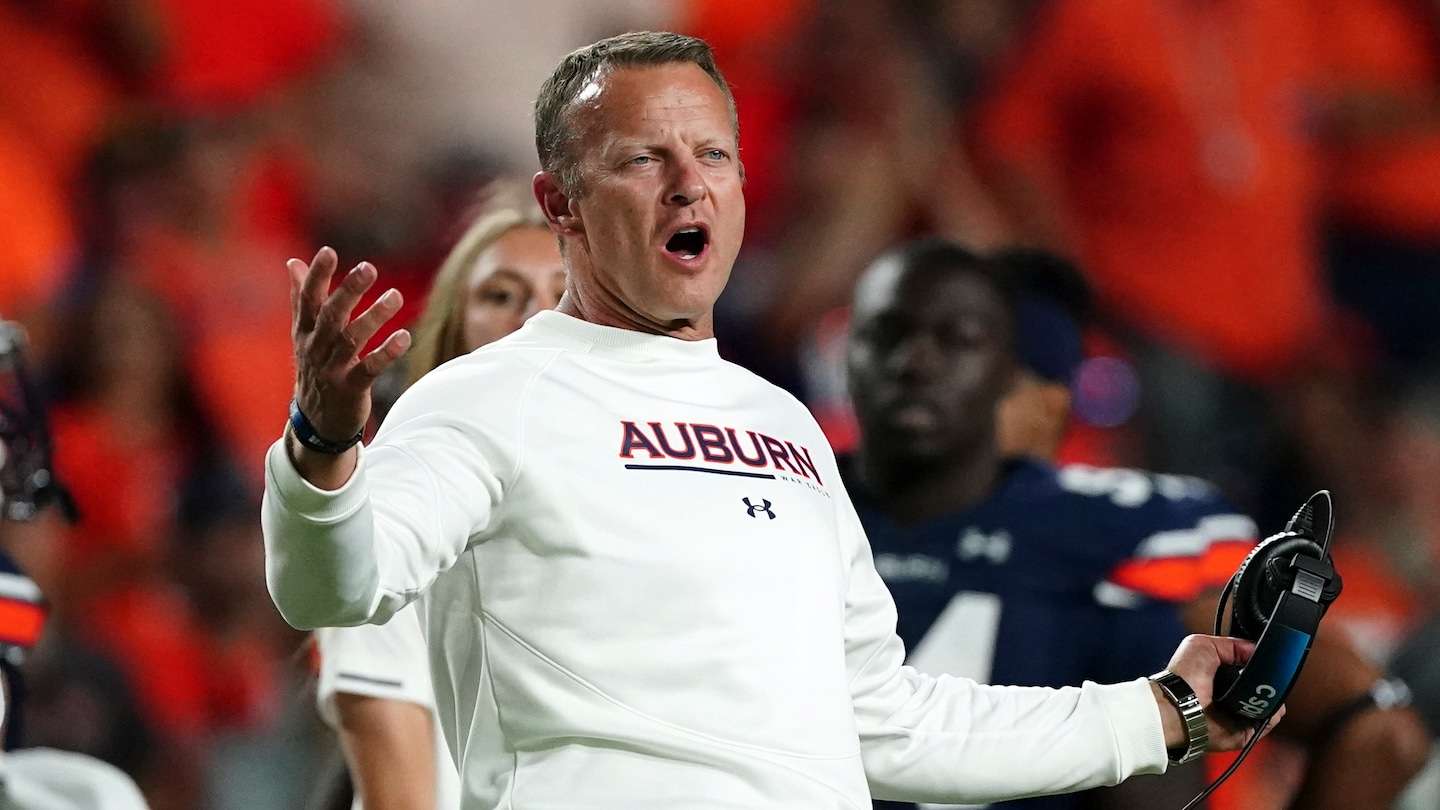A college football firing that seemed to loom through the first two months of the season finally happened on Monday, when Auburn jettisoned Bryan Harsin, its out-of-the-box hire of December 2020. Harsin leaves as the first full-time Auburn coach with a sub-.500 record — in his case, 9-12 — since Earl Brown wrapped up his three-year tenure in 1950 with the rarefied glumness of 3-22-4.
Auburn fires Bryan Harsin in the middle of his second season

Harsin, who lasted until Week 9 of his second Auburn season, became the sixth Power Five coach fired during this season in the mad dash to compete at American football, following upon Scott Frost at Nebraska after Week 2, Herm Edwards at Arizona State after Week 3, Geoff Collins at Georgia Tech after Week 4, and both Paul Chryst at Wisconsin and Karl Dorrell at Colorado after Week 5. Harsin became third Auburn non-interim coach fired in the last 11 autumns, and gave the turbulent program a near-full dinner set of firing months in that span: Gene Chizik in November 2012, Gus Malzahn in December 2020, and Harsin in October 2022.
He exits partway into a six-year, $31.5 million contract, hauling home $15 million of it, two years after Malzahn exited partway into a seven-year, $49 million extension, hauling home $21 million of it. That doesn’t include the $5 million Kevin Steele culled on his way out after serving as interim coach after Malzahn’s exit in late 2020.
“Auburn University has decided to make a change in the leadership of the Auburn University football program,” the university said Monday in a statement that did not mention Harsin by name. “President (Christopher) Roberts made the decision after a thorough review and evaluation of all aspects of the football program. Auburn will begin an immediate search for a coach that will return the Auburn program to a place where it is consistently competing at the highest levels and representing the winning tradition that is Auburn football.”
Roberts, a former dean of Auburn’s college of engineering with a doctorate in chemical engineering from Notre Dame, would be the third Auburn president since the beginning of 2019, and he has overseen two jolts since assuming his role in May 2022. The athletic director who hired Harsin, Allen Greene, resigned in late August. Roberts’s thorough evaluation might have included a jarring sight from last Saturday afternoon on The Plains of eastern Alabama: emptied stands during a fourth quarter. That sight backdropped Auburn’s 38-13 deficit to Arkansas, which became a 41-27 defeat, which marked a second home thumping of the year.
The other, on Sept. 17, came to Penn State, by 41-12.
After that, and after a hair-raising weathering of Missouri in overtime at home on Sept. 24 that made Auburn 3-1, there came four straight losses that instructed Auburn, the 2010 national champion and 2013 national runner-up, as to its present-day place in its loathing-rich neighborhood. Those four came to LSU by 21-17 at home, to defending national champion Georgia by 42-10 on the road, to rising Ole Miss by 48-34 on the road, and to Arkansas by the aforementioned ransacking.
When Greene hired Harsin two winters ago, the wildly successful seven-year coach at Boise State did seem a potential misfit in a far-flung place, having played quarterback for both Capital High School in Boise, Idaho, and at Boise State (1995-99), then coached that ambitious program from 2014-20, going 69-19. “I knew it would take a special opportunity to get me out of Boise,” Harsin began by stating, “and Auburn is exactly that.”
He ventured diagonally across the country to a land and a program noted for its political factions and rambunctious boosters, and people did fret about the recruiting. Auburn sits at No. 46 in the current Rivals listings for the 2023 class.
Harsin opened at 6-2 and seemed maybe fine, then lost five straight to close the 2021 season at 6-7, lost by 17-13 to Houston in a Birmingham Bowl that does not tend to turn up in Auburn daydreams, and weathered an inquiry into his program last February. He summarized that famously at SEC Media Days by saying, “It was uncomfortable. It was unfounded .… And it didn’t work.”
He spoke after an opening season noted for blown leads rather than blowouts. His fleeting tenure might have taken on an entirely different tenor but for one Alabama possession in the Iron Bowl last Nov. 27 at Auburn.
In that possession, Alabama and Heisman Trophy winner Bryce Young started off 97 yards from the goal line with 95 seconds left and a 10-3 deficit. Young steered the Crimson Tide through 12 hairy plays that included a third-and-10 from the 3, a fourth-and-7 from the Auburn 42 and a third-and-10 from the Auburn 28, connecting with Ja’Corey Brooks for a 28-yard touchdown pass on that last inconvenience.
Alabama won, 24-22, in four overtimes, when it would have earned Harsin more clout to go 1-0 in the rivalry widely perceived to carry the country’s highest level of mutual revulsion. Four Auburn firings or resignations have come during the 16-season tenure of Alabama coach Nick Saban — Harsin (at 9-12), Malzahn (68-35), Chizik (33-19) and Tommy Tuberville’s resignation in December 2008 (85-40) — as Saban’s six national titles at Alabama have hurled further pressure across the state toward Auburn.






